人教版八年级英语上册各单元知识点讲解
人教版八年级英语上册笔记1--10单元

人教版八年级英语上册笔记1--10单元精心整理超详细!人教版八年级英语上册笔记1--10单元Unit 1 Where did you go on vacation ?Section A 知识提纲一、词形变化1.wonder v. 想知道→adj. wonderful 精彩的,绝妙的二、短语1.go on vacation去度假2.stay at home待在家里3.go to the mountains去爬山4.go to the beach去海滩5.visit museums 参观博物馆6.go to summer camp去参加夏令营7.quite a few相当多 8.study for tests为测验而学习9.go out出去 10.go out with anyone 跟别人出去11.most of the time大部分时间 12.of course=sure =certainly 当然13.have a good time doing=have fun doing =enjoy oneself 玩得高兴14.go shopping去购物 15. keep a diary 写日记三、词法1. buy sb. sth.=buy sth. for sb.为某人买某物Buy me some books = Buy some books for me .2.taste / look/sound/smell good. 尝起来/看起来/听起来/闻起来不错3.nothing…but+动词原形除了……之外什么都没有I have nothing to do but watch TV all day .我整天除了看电视什么也没干。
4.seem link v.(系动词) 似乎,好像,看来① seem + adj.② seem to do sth.③ It seems that + 陈述句5.Long time no see . 好久不见。
人教版八年级英语上册知识点总结和复习要点
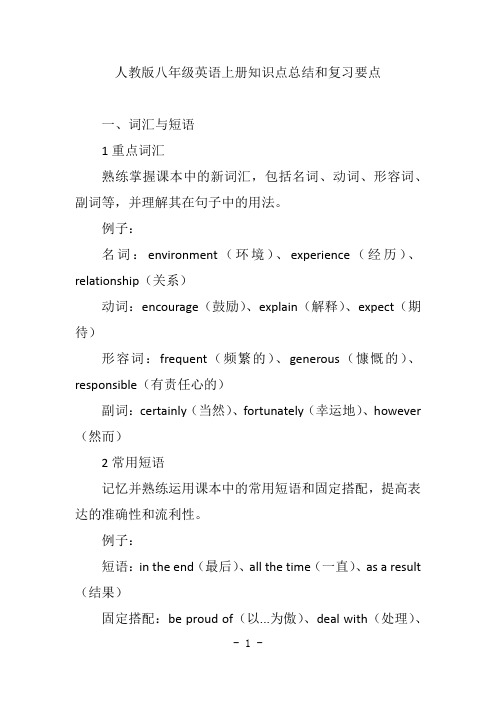
人教版八年级英语上册知识点总结和复习要点一、词汇与短语1重点词汇熟练掌握课本中的新词汇,包括名词、动词、形容词、副词等,并理解其在句子中的用法。
例子:名词:environment(环境)、experience(经历)、relationship(关系)动词:encourage(鼓励)、explain(解释)、expect(期待)形容词:frequent(频繁的)、generous(慷慨的)、responsible(有责任心的)副词:certainly(当然)、fortunately(幸运地)、however (然而)2常用短语记忆并熟练运用课本中的常用短语和固定搭配,提高表达的准确性和流利性。
例子:短语:in the end(最后)、all the time(一直)、as a result (结果)固定搭配:be proud of(以...为傲)、deal with(处理)、pay attention to(注意)二、句型与语法1基本句型熟练掌握五种基本句型,包括主语+谓语、主语+谓语+宾语、主语+谓语+间接宾语+直接宾语、主语+谓语+宾语+宾语补足语、主语+系动词+表语。
例子:主语+谓语:She sings.(她唱歌。
)主语+谓语+宾语:I like apples.(我喜欢苹果。
)主语+谓语+间接宾语+直接宾语:He gave me a book.(他给了我一本书。
)主语+谓语+宾语+宾语补足语:I found the book interesting.(我发现这本书很有趣。
)主语+系动词+表语:She is beautiful.(她很漂亮。
)2时态深入学习并掌握现在完成时、过去进行时、一般将来时、过去将来时等时态的用法和形式。
例子:现在完成时:I have already seen that movie.(我已经看过那部电影了。
)过去进行时:They were playing football when I called them.(我打电话给他们时,他们正在踢足球。
(完整版)人教版八年级英语上册各单元知识点归纳和作文范文

新课标八年级上册英语单元知识点归纳Unit1 Where did you go on vacation?短语归纳1.go on vacation去度假2.stay at home待在家里3.go to the mountains去爬山4.go to the beach去海滩5.visit museums 参观博物馆6.go to summer camp去参加夏令营7.quite a few相当多8.study for tests为测验而学习9.go out出去10.most of the time大部分时间11.have a good time doing=have fun doing =enjoy oneself玩得高兴12.of course=sure =certainly当然13.feel like给……的感觉;感受到14.go shopping去购物15.in the past在过去16.walk around四处走走17.because of+名词短语:因为because+句子18. a/one bowl of…一碗……19. the next day第二天20.drink tea喝茶21.find out找出;查明22.go on继续23.take photos照相24.something important重要的事25.up and down上上下下e up出来come out 出版发行27.go out with anyone 跟别人出去28.say about 发表对…看法29.rain hard 雨下得大30.too much+不可数名词太多too many+可数名词复数太多much too+形容词太用法:1.buy sth. for sb. / buy sb. sth.为某人买某物2.taste / look/sound/smell good. 尝起来/看起来/听起来/闻起来不错3.nothing…but+动词原形除了……之外什么都没有4.seem+(to be)+ adj. 看起来……5.arrive in+大地点/ arrive at+小地点/get to +地点/reach +地点到达某地6.decide to do sth.决定去做某事7.try doing sth.尝试做某事/ try to do sth.尽力去做某事8.forget doing sth.忘记做过某事/ forget to do sth.忘记做某事9.enjoy doing sth.喜欢做某事10. want to do sth.想去做某事11.start doing sth.开始做某事12.stop doing sth. 停止做某事13.dislike doing sth. 不喜欢做某事14.keep doing sth.继续做某事keep on doing sth 不停做某事15.Why not do. sth.=why don’t you do sth为什么不做……呢?16.so+adj.+that+从句如此……以至于……17.tell sb. (not) to do sth. 告诉某人(不要)做某事18.enough +名词,形容词+enough19.not really .真的没有。
人教版八年级英语上册知识点总结(全)
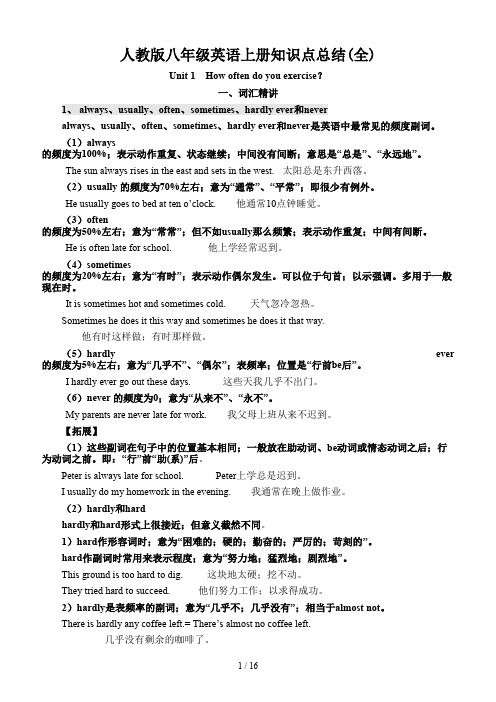
人教版八年级英语上册知识点总结(全)Unit 1 How often do you exercise?一、词汇精讲1、 always、usually、often、sometimes、hardly ever和neveralways、usually、often、sometimes、hardly ever和never是英语中最常见的频度副词。
(1)always的频度为100%;表示动作重复、状态继续;中间没有间断;意思是“总是”、“永远地”。
The sun always rises in the east and sets in the west. 太阳总是东升西落。
(2)usually 的频度为70%左右;意为“通常”、“平常”;即很少有例外。
He usually goes to bed at ten o’clock. 他通常10点钟睡觉。
(3)often的频度为50%左右;意为“常常”;但不如usually那么频繁;表示动作重复;中间有间断。
He is often late for school. 他上学经常迟到。
(4)sometimes的频度为20%左右;意为“有时”;表示动作偶尔发生。
可以位于句首;以示强调。
多用于一般现在时。
It is sometimes hot and sometimes cold. 天气忽冷忽热。
Sometimes he does it this way and sometimes he does it that way.他有时这样做;有时那样做。
(5)hardly ever 的频度为5%左右;意为“几乎不”、“偶尔”;表频率;位置是“行前be后”。
I hardly ever go out these days. 这些天我几乎不出门。
(6)never 的频度为0;意为“从来不”、“永不”。
My parents are never late for work. 我父母上班从来不迟到。
人教版八年级上册英语Units1-10单元知识点归纳

榕江县心灵英语培训教材第1页八年级上册英语Units1—10单元知识点归纳 Unit1 Where did you go on vacation?go on vacation 去度假 stay at home 待在家里 go to the mountains 去爬山 go to the beach 去海滩visit museums 参观博物馆 go to summer camp 去参观夏令营 quite a few 相当多 study for 为……而学习go out 出去 most of the time 大部分时间 taste good 尝起来很好吃 have a good time=have fun 玩得高兴 +v 。
ing of course 当然 feel like 给……的感觉;感受到go shopping 去购物 in the past 在过去 walk around 四处走走 because of 因为 one bowl of … 一碗…… the next day 第二天 drink tea 喝茶 find out 找出;查明 go on 继续 take photos 照相 something important 重要的事 up and down 上上下下 come up 出来 buy sth. for sb 。
/ buy sb 。
sth.为某人买某物taste + adj 。
尝起来…… look+adj 。
看起来…… nothing …but+动词原形 除了……之外什么都没有 seem+(to be )+ adj 。
看起来…… arrive in+大地点 / arrive at+小地点 到达某地 decide to do sth 。
决定去做某事try doing sth 。
尝试做某事 / try to do sth.尽力去做某事 forget doing sth.忘记做过某事/ forget to do sth.忘记做某事 enjoy doing sth 。
(人教版新目标)八年级英语上册全册各单元知识点期末总复习讲解教学课件

3. feel like “感受到;摸起来”,后跟宾语 从句或名词。 I felt like I was a bird. 我感觉我是一只鸟。 It feels like a stone. 它摸起来像一块石头。
eg.something special; somewhere wonderful. 2.不定代词做主语时,谓语动词用第三人称单数。 eg.Is everybody here? 大家都到齐了吗?
1. get to/reach/arrive 都是“到达“的意思。
get to+sp=reach+sp = arrive at+sp(小)=arrive in+sp(大) 若他们后面要加地点副词here, there, home等,则 不需要加介词。
25、up and down上上下下 26、come up出来 27、enjoy oneself=have fun=have a good time
玩的开心
二、重要句子(语法):
1.Where did you go on vacation? 你到哪里去度假了?
I went to New York City. 我去了纽约城。
三、习惯用法、搭配
1. buy sth. for ab./ buy sb. sth. 为某人买某物 2. taste + adj. 尝起来…… 3. nothing to do but do除了……之外无事可干 4. seem + (to be) + adj 看起来 5. arrive in + 大地方 / arrive at + 小地方 到达某地 6. decide to do sth=make a decision决定做某事 7. try doing sth. 尝试做某事
人教版八年级英语上册基础知识整理

人教版八年级英语上册基础知识整理一. 课文篇章知识1. 课文内容人教版八年级英语上册包含了多个单元,每个单元都有若干课文。
在研究这些课文时,我们需要了解以下内容:- 课文的主旨和主题是什么?- 课文中的重点句子和关键词是哪些?- 课文中的重要观点和细节有哪些?- 课文的结构和篇章的连贯性如何?2. 课文背景知识为了更好地理解课文,我们还需要了解一些相关的背景知识,包括但不限于:- 人物背景:课文中出现的人物的基本信息和他们之间的关系。
- 地理环境:课文中描述的地点和相关的地理环境特点。
- 历史背景:课文中涉及到的历史事件或文化背景。
- 社会风俗:课文中提到的俗、礼仪等社会文化现象。
二. 语法知识在人教版八年级英语上册中,我们需要掌握以下语法知识:- 时态:包括一般现在时、一般过去时、一般将来时等基本时态的构成和用法。
- 句型:如陈述句、疑问句、祈使句等不同类型的句子的构成和用法。
- 从句:包括宾语从句、定语从句、状语从句等的构造和用法。
- 语法规则:如动词的时态和语态变化规则、名词的格和数的变化规则等。
三. 词汇知识人教版八年级英语上册涉及了大量的词汇研究,我们需要重点掌握以下内容:- 单词拼写:研究并掌握每个单元的重点单词的拼写。
- 单词释义:理解每个单元的重点单词的意思。
- 词组搭配:研究并掌握常见的词组搭配和短语。
- 同义词和反义词:掌握一些常用的同义词和反义词。
四. 写作技巧在研究英语的过程中,除了需要掌握语法和词汇知识外,还要注重培养写作技巧。
在人教版八年级英语上册中,我们需要关注以下写作技巧:- 句子结构:研究并模仿不同类型的句子结构,如并列句、复合句等。
- 连词和连接词:研究使用适当的连词和连接词来组织句子和段落。
- 衔接词:研究使用适当的衔接词和过渡词使文章连贯。
- 多样性表达:研究使用不同的词汇和表达方式来增强文章的多样性。
以上是人教版八年级英语上册基础知识的整理,通过对这些知识的掌握和应用,可以帮助我们更好地理解课文,提高英语听、说、读、写的能力。
人教版新目标八年级英语上册各单元知识详解
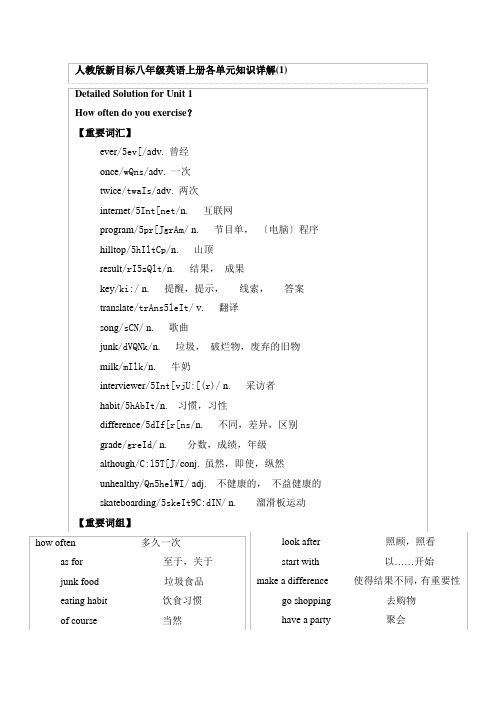
Detailed Solution for Unit 2 What’s the matter.【重要词汇】◆ matter/5mAt[/n.事情,问题,过失◆ arm/B:m/n.臂,胳膊◆ back/bAk/n.后背,背脊◆ ear/I[/n.耳朵◆ eye/aI/n.眼睛◆ foot/fJt/n.脚,足〔pl. feet/fi:t/〕◆ leg/leg/n.腿,腿部◆ neck/nek/n.脖子,颈部◆ nose/n[Jz/n.鼻子◆ stomach/5stQm[k/n.胃,胃部◆ tooth/tU:W/n.牙齿(pl. teeth/ti:W/)◆ sore/sC:,sC[/adj.疼痛的◆ stomachache/5stQm[keIk/n.胃痛,腹痛,肚子痛◆ throat/Wr[Jt/n.喉头,喉咙◆ toothache/5tU:WeIk/n.牙痛◆ fever/5fi:v[/n.发烧◆ lie/laI/v.躺,卧,平放在某处(lay, lain)◆ honey/5hQnI/n.蜂蜜◆ dentist/5dentIst/n.牙医◆ illness/5IlnIs/n.疾病,生病◆ advice/[d5vaIs/n.劝告,忠告,建议◆ thirsty/5W\:stI/adj.渴的,口渴的◆ heal/hi:l/v. 医治,治愈◆ balance/5bAl[ns/n. 平衡,平衡状态,协调◆ beef/bi:f/n. 牛肉◆ lamb/lAm/n. 小羊,羊羔,羊羔肉◆ energy/5en[dVI/n.精力,活力,能力◆ life/laIf/n. 生命,人生◆ bean/bi:n/n.豆,豆科植物◆ stray/streI/v. 远离,走失,离题◆ balanced/5bAl[nst/adj.平衡的,协调的◆ diet/5daI[t/n. 饮食,节食◆ backache/5bAkeIk/n.背痛◆ improve/Im5prU:v/v. 改善,改进,提高◆ speaking/5spi:kIN/ n. 口语◆ headache/5hedeIk/ n. 头痛◆ homestay/5h[JmsteI/ n. 待在家里◆ important//Im5pC:t[nt/adj. 重要的,重大的,严重的【重要词组】◆ have a cold患感冒◆ stressed out 紧张的,有压力的◆ bean sprout豆芽◆ get tired感觉疲惫◆ stay healthy保持健康◆ at the moment此刻,现在◆ get/ have a cold患感冒◆ see a doctor /dentist看医生/牙医◆ go to the party去参加聚会◆ make sb sick使某人不舒服(患锁病)◆ have a sore throat嗓子痛◆ have a fever发烧,发热◆ have a toothache牙痛◆ have a backache背痛◆ lie down and rest 躺下休息◆ drink lots of water 喝大量水◆ drink hot tea with honey 喝热蜂蜜茶◆ have a headache头痛◆ get tired 累了【重要词汇扩展】身体部位:head头neck颈部shoulder肩back后背leg腿thigh大腿arm手臂hand手nose 鼻子eye眼睛ear耳朵mouth嘴tooth牙齿foot脚〔注意foot的复数形式为feet,tooth的复数形式为teeth〕stomach胃throat喉咙,咽喉chest胸部pit胸口abdomen lung肺heart心脏liver 肝脏腹部waist腰backbone脊骨,脊柱hip臂部joint关节muscle肌肉nerve神经brain 脑疾病:cancer癌 influenza , flu流感 cough咳嗽sore eyes眼睛疼stuffy nose鼻子不通气 insomnia失眠医院工作人员:doctor in charge主治医生 head nurse护士长internist , physician内科医生surgeon外科医生dentist牙科医生 ear-nose-throat doctor 耳鼻喉医生医院名称:children’s hospital儿童医院 clinic 诊疗所first - aid station 急救站 ward 病房medical department 内科 surgical department 外科registration office 挂号处 out - patient department(OPD) 门诊部in - patient department 住院部 nursing department 护理部waiting room 候诊室 emergency room 急诊室operation room 手术室 laboratory 化验室blood bank 血库 pharmacy , dispensary 药房表示感觉的形容词有:tired 累的 thirsty口渴的 hungry饿的 stressed out紧张的,有压力的【重要词句详解】1. How to talk about our health①问某人哪儿不舒服:When we are not feeling well , we often go to see the doctor . The doctor will ask : What’s wrong (with you) ?What’s the matter (with you) ?What’s your trouble ?What happens to you ?Is there anything wrong with you ?都表示“你怎么了?”。
新人教版八年级上册英语单元语法及知识点概述
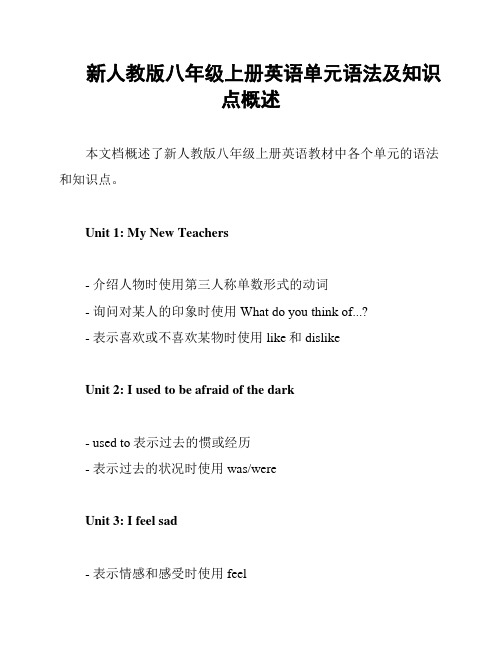
新人教版八年级上册英语单元语法及知识点概述本文档概述了新人教版八年级上册英语教材中各个单元的语法和知识点。
Unit 1: My New Teachers- 介绍人物时使用第三人称单数形式的动词- 询问对某人的印象时使用What do you think of...?- 表示喜欢或不喜欢某物时使用like和dislikeUnit 2: I used to be afraid of the dark- used to表示过去的惯或经历- 表示过去的状况时使用was/wereUnit 3: I feel sad- 表示情感和感受时使用feel- 使用be动词+形容词表达情感状态- 表示总是或经常做某事时使用always或often Unit 4: What's the best movie theater?- 比较级和最高级的用法- 询问建议时使用What do you suggest?- 表示原因时使用becauseUnit 5: It must belong to Carla- 表示推测或某事是肯定的时使用must- 表示推测或某事是可能的时使用might- 表示推测或某事是否定的时使用can'tUnit 6: I like music that I can dance to- 表示喜欢某种中性事物时使用like- 表示喜欢可以+动词原形的事物- 表示不喜欢不可以+动词原形的事物Unit 7: Teenagers should be allowed to choose their own clothes- 表示应该或不应该做某事时使用should or shouldn't- 表示能够或不允许做某事时使用can or can't- 使用be动词+动词不定式表示被允许或不被允许做某事Unit 8: Home alone- 表示需要或必需做某事时使用have to- 表示过去需要或必需做某事时使用had to- 表示建议或推荐时使用should或had betterUnit 9: When was it invented?- 使用一般过去时表示过去的经历或事件- 使用一般过去时的疑问句形式提问过去的经历或事件- 使用介词短语表示一段时间以上是新人教版八年级上册英语教材中各单元的语法和知识点概述。
人教版英语:八年级上册各单元重难点知识整理

人教版英语:八年级上册各单元重难点知识整理Unit 1: I am looking forward to going to school.- 重点知识:- 类别:Present continuous tense- 用法:表达将来要发生的动作或计划- 难点知识:- 类别:Different ways to express future plans- 用法:研究多种表达未来计划的方式,如be going to, will, want to, hope to, plan to等Unit 2: What should I do?- 重点知识:- 类别:Modal verbs- 用法:情态动词can, could, may, might, should, would, must等的用法及区别- 难点知识:- 类别:Expressing advice or suggestions- 用法:研究如何表达建议或提出建议的方式,如should, could, suggest等Unit 3: Teenagers should be allowed to choose their own clothes.- 重点知识:- 类别:Modal verbs of permission- 用法:情态动词may, can, could, might, allowed to等表达允许或禁止的用法- 难点知识:- 类别:Expressing opinions and arguments- 用法:研究如何表达自己的观点,以及进行辩论和讨论的技巧Unit 4: I used to be afraid of the dark.- 重点知识:- 类别:Used to和be used to的用法- 用法:表达过去的惯或状态,以及适应某种情况的能力- 难点知识:- 类别:Describing past experiences- 用法:研究如何用英语描述过去的经历和事件,如时间状语的运用以及动词的过去式形式Unit 5: It must belong to Carla.- 重点知识:- 类别:Modal verbs of deduction- 用法:情态动词must, might, can't, could等表示推断或猜测的用法- 难点知识:- 类别:Making deductions from clues- 用法:研究如何从线索中推断事物的归属,以及如何用英语表达自己的推论Unit 6: I like music that I can dance to.- 重点知识:- 类别:Defining relative clauses- 用法:用于对前面所指的事物做进一步描述或解释- 难点知识:- 类别:Identifying and describing preferences- 用法:研究如何描述自己的喜好和对事物的评价,以及如何用英语进行描述和表达Unit 7: Would you mind turning down the music?- 重点知识:- 类别:Polite requests and permission- 用法:研究如何礼貌地表达请求和征求许可的方式,如would you mind, could you, may I等- 难点知识:- 类别:Asking for and giving permission- 用法:研究如何询问和给予许可的表达方式,如can, may, is it all right等Unit 8: I will be able to go to all the places I have dreamed of.- 重点知识:- 类别:Future tense (will and be going to)- 用法:研究如何用will和be going to表达将来的动作和计划- 难点知识:- 类别:Expressing dreams and aspirations- 用法:研究如何用英语表达自己的梦想和渴望,以及对未来的展望和期望的表达方式以上是人教版英语八年级上册各单元的重难点知识整理。
人教版八年级上册英语Unit-1-5-全部词汇详解课件(137页)全文

taste it.
prep. & adv. 在……下面; 到……下面
反义词: above,意为“超过;在……上面”。 例句: ◆ From the top of the building, I could
短语:twice a week 一周两次 think twice 再三考虑
例句: ◆ I go to the movies twice a week. ◆ The ruler is twice as long as that one.
拓展: “一次”用once,“两次”用twice, “三次及以上”用“基数词+times” 如:twice a day, four times a year
dislikes.
Unit 2 How often do you exercise?
Section A
n.家务劳动; 家务事
构成: house(n. 房子)+ work( n. 工作) 短语:do (the) housework 做家务 例句:
◆ He is too lazy so he hardly does housework.
拓展:enjoyable 的相关词 enjoy: v. 享受;喜爱 enjoyment: activities 例句: The park is a popular place
for relaxing activities.
v. 决定;选定
句型: decide (not) to do sth. 决定(不)做某事 decide+“疑问词+动词不定式” decide+宾语从句 decide on sth. 就某事做决定;选定某事 例句:
人教新目标英语八年级上册unit1-Unit4单元重点知识复习
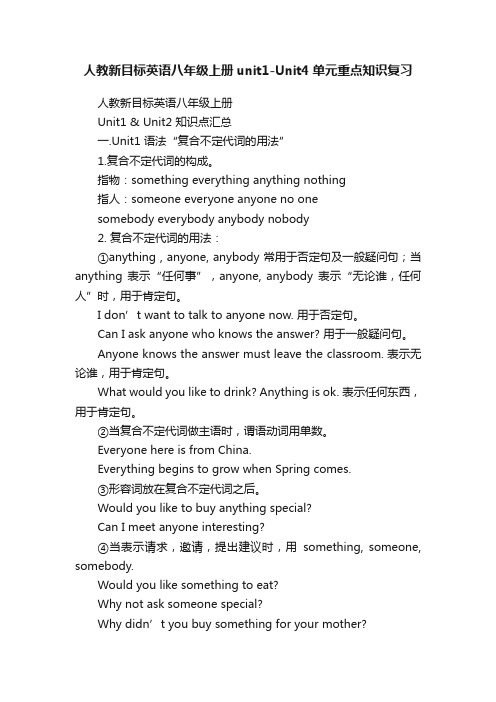
人教新目标英语八年级上册unit1-Unit4单元重点知识复习人教新目标英语八年级上册Unit1 & Unit2 知识点汇总一.Unit1 语法“复合不定代词的用法”1.复合不定代词的构成。
指物:something everything anything nothing指人:someone everyone anyone no onesomebody everybody anybody nobody2. 复合不定代词的用法:①anything , anyone, anybody 常用于否定句及一般疑问句;当anything 表示“任何事”,anyone, anybody 表示“无论谁,任何人”时,用于肯定句。
I don’t want to talk to anyone now. 用于否定句。
Can I ask anyone who knows the answer? 用于一般疑问句。
Anyone knows the answer must leave the classroom. 表示无论谁,用于肯定句。
What would you like to drink? Anything is ok. 表示任何东西,用于肯定句。
②当复合不定代词做主语时,谓语动词用单数。
Everyone here is from China.Everything begins to grow when Spring comes.③形容词放在复合不定代词之后。
Would you like to buy anything special?Can I meet anyone interesting?④当表示请求,邀请,提出建议时,用something, someone, somebody.Would you like something to eat?Why not ask someone special?Why didn’t you buy something for your mother?Unit2 语法“频率副词”How often 常用于对频率的提问,意为“多长时间一次”,其答语可以是once/ twice / three times a week; always/ usually/ often/ sometimes/ hardly ever/ never 等表示时间频率的副词及短语。
初二英语知识点总结归纳上册人教版
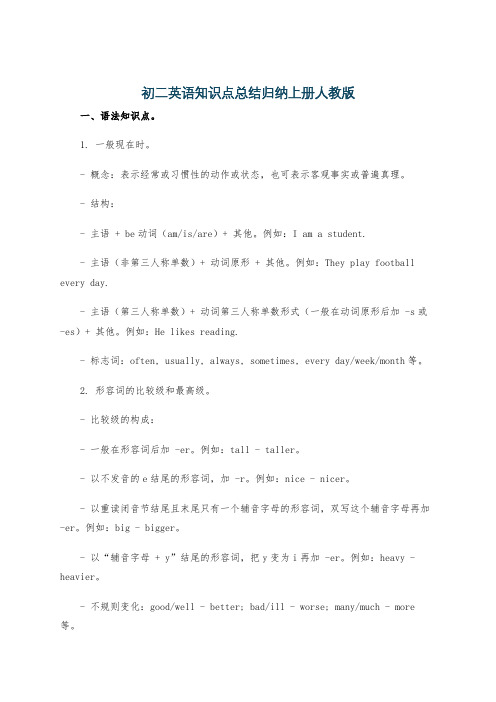
初二英语知识点总结归纳上册人教版一、语法知识点。
1. 一般现在时。
- 概念:表示经常或习惯性的动作或状态,也可表示客观事实或普遍真理。
- 结构:- 主语 + be动词(am/is/are)+ 其他。
例如:I am a student.- 主语(非第三人称单数)+ 动词原形 + 其他。
例如:They play football every day.- 主语(第三人称单数)+ 动词第三人称单数形式(一般在动词原形后加 -s或-es)+ 其他。
例如:He likes reading.- 标志词:often, usually, always, sometimes, every day/week/month等。
2. 形容词的比较级和最高级。
- 比较级的构成:- 一般在形容词后加 -er。
例如:tall - taller。
- 以不发音的e结尾的形容词,加 -r。
例如:nice - nicer。
- 以重读闭音节结尾且末尾只有一个辅音字母的形容词,双写这个辅音字母再加-er。
例如:big - bigger。
- 以“辅音字母 + y”结尾的形容词,把y变为i再加 -er。
例如:heavy - heavier。
- 不规则变化:good/well - better; bad/ill - worse; many/much - more 等。
- 比较级的用法:- 表示两者之间的比较,常用结构“比较级+than”。
例如:He is taller than me.- 最高级的构成:- 一般在形容词后加 -est。
例如:tall - tallest。
- 以不发音的e结尾的形容词,加 -st。
例如:nice - nicest。
- 以重读闭音节结尾且末尾只有一个辅音字母的形容词,双写这个辅音字母再加-est。
例如:big - biggest。
- 以“辅音字母 + y”结尾的形容词,把y变为i再加 -est。
例如:heavy - heaviest。
新人教版英语八年级上各单元知识点大归纳
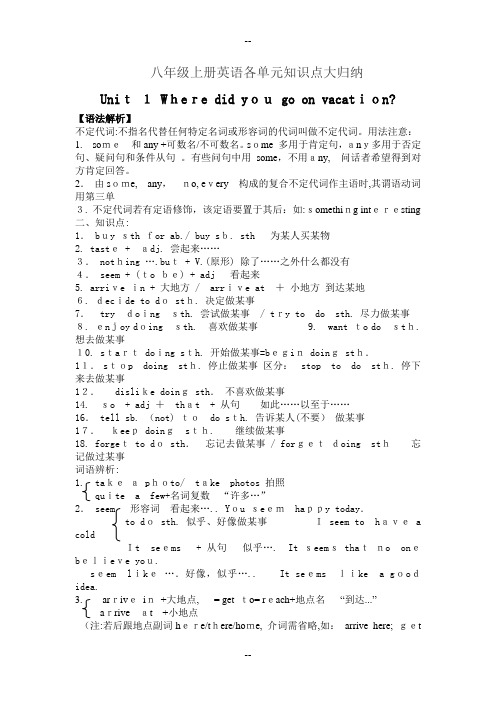
八年级上册英语各单元知识点大归纳Unit1 Where did you go on vacation?【语法解析】不定代词:不指名代替任何特定名词或形容词的代词叫做不定代词。
用法注意:1.some和any +可数名/不可数名。
some 多用于肯定句,any多用于否定句、疑问句和条件从句。
有些问句中用some,不用any,问话者希望得到对方肯定回答。
2.由some,any,no, every构成的复合不定代词作主语时,其谓语动词用第三单3. 不定代词若有定语修饰,该定语要置于其后:如:something interesting 二、知识点:1. buy sth for ab./ buy sb. sth 为某人买某物2. taste + adj. 尝起来……3. nothing ….but + V.(原形) 除了……之外什么都没有4. seem + (to be) + adj 看起来5. arrive in + 大地方 / arrive at +小地方到达某地6. decide to do sth. 决定做某事7.try doing sth. 尝试做某事/ try to do sth. 尽力做某事8. enjoy doing sth. 喜欢做某事9. want to do sth. 想去做某事10. start doing sth. 开始做某事=begin doing sth.11. stop doing sth. 停止做某事区分:stop to do sth. 停下来去做某事12. dislike doing sth.不喜欢做某事14. so + adj +that + 从句如此……以至于……16. tell sb. (not) todo sth. 告诉某人(不要)做某事17.keep doingsth. 继续做某事18. forget to do sth.忘记去做某事 / forgetdoing sth忘记做过某事词语辨析:1. takea photo/ take photos 拍照quite a few+名词复数“许多…”2. seem 形容词看起来….. You seemhappy today.to do sth. 似乎、好像做某事I seem to have a coldIt seems + 从句似乎…. It seems thatno onebelieve you.seem like….好像,似乎….. It seems like a goodidea.3. arrivein+大地点, = get to= reach+地点名“到达...”arriveat+小地点(注:若后跟地点副词here/there/home, 介词需省略,如:arrive here; gethome)4.feellikesth/ doingsth.感觉像是…5.wonder “想知道”,+疑问词(who, what,why)引导的从句。
新人教版八年级上册英语单元语法及知识点归纳汇总

新人教版八年级上册英语单元语法及知识点归纳Unit1 Where did you go on vacation?【重点语法】不定代词:不指名代替任何特定名词或形容词的代词叫做不定代词。
用法注意:1. some 和any +可数名/不可数名。
some 多用于肯定句,any多用于否定句、疑问句和条件从句。
有些问句中用some,不用any, 问话者希望得到对方肯定回答。
2. 由some, any, no, every 与body, one, thing构成的复合不定代词作主语时,其谓语动词用三单。
3. 不定代词若有定语修饰,该定语要置于其后:如:something interesting【重点短语】1. buy sth for ab./ buy sb. sth 为某人买某物2. taste + adj. 尝起来……3. nothing...but + V.(原形) 除了……之外什么都没有4. seem + (to be) + adj 看起来5. arrive in + 大地方/ arrive at + 小地方到达某地6. decide to do sth. 决定做某事7. try doing sth. 尝试做某事/ try to do sth. 尽力做某事8. enjoy doing sth. 喜欢做某事9. want to do sth. 想去做某事10. start doing sth. 开始做某事=begin doing sth.11. stop doing sth. 停止做某事区分:stop to do sth. 停下来去做某事12. dislike doing sth. 不喜欢做某事14. so + adj + that + 从句如此……以至于……16. tell sb. (not) to do sth. 告诉某人(不要)做某事17. keep doing sth. 继续做某事18. forget to do sth. 忘记去做某事/ forget doing sth 忘记做过某事【词语辨析】1. take a photo/ take photos 拍照quite a few+名词复数“许多…”2. seem + 形容词看起来…... You seem happy today.seem + to do sth. 似乎/好像做某事I seem to have a coldIt seems + 从句似乎..…. It seems that no one believe you.seem like ... 好像,似乎….. It seems like a good idea.3. arrive in +大地点= get to= reach+地点名“到达......”arrive at +小地点(注:若后跟地点副词here/there/home, 介词需省略,如:arrive here; get home)4. feel like sth 感觉像…feel doing sth. 想要做某事5. wonder(想知道)+疑问词(who, what, why)引导的从句。
- 1、下载文档前请自行甄别文档内容的完整性,平台不提供额外的编辑、内容补充、找答案等附加服务。
- 2、"仅部分预览"的文档,不可在线预览部分如存在完整性等问题,可反馈申请退款(可完整预览的文档不适用该条件!)。
- 3、如文档侵犯您的权益,请联系客服反馈,我们会尽快为您处理(人工客服工作时间:9:00-18:30)。
Unit1 Where did you go on vacation?1. go on vacation 度假holiday但vacation表示长的假期2. visit museums 参观博物馆3. go to summer camp去夏令营4.something interesting有趣的东西5. in excitement兴奋地1)something,anything,nothing,everything是指物的不定代词。
somebody,someone,anybody,anyone,nobody,everybody,everyone是指人的不定代词。
2)当形容词修饰不定代词、不定副词时,放于其后;如,something special;3)something,somebody,someone,somewhere用于肯定句,表示请求或建议的疑问句中,而anything,anybody,anyone,anywhere用于否定句、疑问句及条件状语从句中。
4.buysth. for sb. 或buy sb. sth 如:buy some books for me. = buy me some books.5.提建议的句子①What/ how about +doing sth.? 如:What/ How about going shopping?②Why don’t you + do sth.? 如:Why don’t you go shopping?③Why not + do sth. ? 如:Why not go shopping?④Let’s + do sth. 如:Let’s go shopping⑤Shall we/ I + do sth.? 如:Shall we/ I go shopping?6. long time no see 好久不见7 . most of the time 大多数时间8.enjoyable activities 令人愉快的活动 19. try paragliding 尝试滑翔伞运动10. 辨析:get to/reach/arrive 都是“到达“的意思get to+地点=reach+地点= arrive at+地点(小)=arrive in+地点(大)11.nothing...but...意为“除......之外;只有”,如:I have nothing to do but watch TV all day long. 我整天除了看电视什么也没干。
12. feel like 意为:“感受到;摸起来”,后跟宾语从句或名词。
如:I felt like I was a bird. 我感觉我是一只鸟。
It feels like a stone. 它摸起来像一块石头。
另外,构成短语feel like doing sth.意为“想做某事”。
如:I feel like eating.我想吃东西。
13.enjoy doing sth . 喜欢做… enjoy oneself 过得愉快=have fun/have a good time.14. the top of the hill 山顶18. feed(fed) hens and pigs 喂鸡和猪15. I wonder what life was like here in the past. 我想知道过去这里的生活是什么样的感到疑惑;想知如:I wonder where they are going.16.Still no one seemed to be bored. 仍然没有人感到烦闷。
1)seem意为“好像;似乎;看来”,是个连系动词,构成的短语有:seem(to be)+adj. 似乎...... 如:He seemed ( to be) ill yesterday. 昨天他似乎病了。
It seems that + 从句似乎...... 如:It seems that he was ill yesterday. 昨天他似乎病了。
2)bored (adj),“感到厌倦的,,其主语是某人;boring(adj),意为无聊的,其主语是某物。
17. Because of the bad weather, we couldn’t see anything below.1)because of + 名词/代词/名短I had to move because of my job. 因为工作的原因18. 形容词/副词+enough 如:She is not old enough to go to school.enough+名词如:enough umbrellas 足够的雨伞19. so+形/副+that 从句:She is so popular that everyone likes her.such+名短+ that 从句:She is such a popular girl that...20.What a difference a day makes! 一天的差异多大啊!1. What a/an + adj.+ n(单)+主+谓!或What + adj. +n(复不)+主+谓!2. How+ adj. +主+谓(联系动词)!或How + adv+主+谓(实义动词)!21. I just stayed at home most of the time to read and relax.Unit2 How often do you exercise?1. exercise (v/n)的用法1)(动):锻炼. 如:He exercises every day.2) (可数名词). 如:do morning/ eye exercises; do math exercises(不可数名词) :如:We often do / take exercise on weekends.2.-How often do you usually go shopping? —Sometimes/Twice a week. 有时候/一周两次.1) go shopping 意为“去购物”。
Go+ v- ing : 表示进行某项活动。
如:Go swimming/ shopping/skating/skiing/fishing/climbing/hiking2)频率副词:always=all the time, usually, often, sometimes=at times , hardly ever, never(1).sometimes: 有时候;sometime:某时;some times:许多次/倍; some time: 一段时间2)how often表示“多久一次”,是对动作的频率进行提问。
其回答通常有:频率副词:always, usually, often, sometimes, hardly ever, neverhow often 次数+时间段: 如:once or twice a weekevery +时间段: every day (每天) 区别:everyday(每天的;日常的)3. 空闲的Are you free tonight? be free 免费的4 junk food 垃圾食品5. 满的;饱的” …be full of… : The bottle is full of water. 瓶子里装满了水。
6.She says it’s good for my health. 她说那对我的健康有益。
(1)be good for:“对……有好处”。
如:Doing exercise is good for our health. (2)be good at:“擅长于……” 如:He is good at playing football.(3) be good with: “与……相处好” 如:The teacher is good with his students. 7.go online = use the Internet :上网8. Teenager magazine 青少年杂志9. more than two hours=over two hours:超过10. go to the dentist: 去看牙医11. keep healthy = stay healthy = keep in good health: 保持健康12. ask sb. to do : 叫…做某事Teacher asked me to clean the classroom.ask sb. about sth. : 问某人某事We asked our students about their free time activities.ask sb. for sth. : 向某人要求… 如:ask teacher for help13. help sb. with sth. 如:They help me with this problem. 他们帮助你解决这个问题。
14. (n) 惊讶: to one’s surprise 令某人惊讶的是in surprise 惊讶地I was surprised at the news = I was surprised to hear the news.15. fifteen percent of the students 百分之十五的学生16. swing dance 摇摆舞17.although(conj):“尽管;虽然”,表示转折关系,同义词有though, 不能与but同时使用。
如:Although they’re neighbors, they don’t play together.= They’re neighbors, but they don’t play together.尽管他们是邻居但是他们不在一起玩。
18. maybe (adv): 也许,大概(Maybe) he (maybe) knows it.如:Maybe he is at home.= He maybe is at home.= He may be at home.19. It’s good to relax by using the Internet or watching game shows.by: 通过… 方式He learns English by singing English songs.through 通过… 方式+ 名词:The best way to relax is through exercise20. such as =like + 名短:如:such as winning the game.21.Old habits die hard. 恶习难改. die(v):死亡;消失death(n): 死亡;22.Most students use it for fun and not for homework.23.You can spend time with your friends and family as you play together.度过(时间)如:spend the weekend with family花费(时间、钱)如:He spent 20 yuan (in) buying the magazine.Unit3 I’m more outgoing than my sister1.事实上in fact2. 唱歌比赛the singing competition 3头发更短的the one with shorter hair 4. 真正关心我truly care about me 5.只要;既然…as long as… 6. 一…就… as soon as…7. 分享一切share everything 8. 与…不同be different from9.与…一致be the same as… 10. 与… 相似的be similar to…13.打电话询问更多信息call for more information14. 形容词和副词的比较1)比较级:表示两者(人或物)之间的比较2)大多数形容词和副词有三个等级:原级、比较级、最高级: good – better - best3.) 加more/most ①.部分双音节和多音节词②.-ed/ing结尾的形容词;③adj+ly→adv.4.) 双写的词:bighot fat thin red wet sad二.比较级基本句型:1实义动词+ adv./ (比than)如:Lucy runs more slowly than Lily.2. 主语必须与对比成分保持一致:Her hair is longer than yours.(→your hair)3as+adj./adv.(原级)+as …如同…一样。
